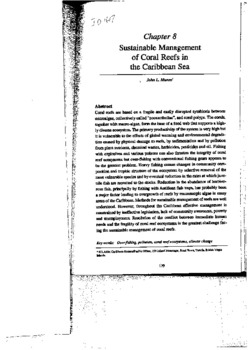Sustainable management of coral reefs in the Caribbean Sea

Citation
ICLARM - The World Fish Center (2001). Sustainable management of coral reefs in the Caribbean Sea. Land and water resources in the Caribbean: proceedings of a conference held 2-4 October 2000 at Accra Beach Hotel, Barbados
Coral reefs are based on a fragile and easily disrupted symbiosis between microalgs.e and coral polyps. The corals, together with macro-algae, form the base of a food web that supports a highly diverse ecosystem. The primary productivity of the system is very high but it is vulnerable to the effects of global warming and environmental degradation caused by physical damage to reefs, by sedimentation and by pollution from plant nutrients, chemical wastes, herbicides, pesticides and oil. Fishing with explosives and various poisons can also threaten the integrity of coral reef ecosystems but over-fishing with conventional fishing gears appears to be the greatest problem. Heavy fishing causes changes in community composition and trophic structure of the ecosystem by selective removal of the most vulnerable species and by eventual reduction in the rates at which juvenile fish are recruited to the stocks. Reduction in the abundance of herbivorous fish, principally by fishing with Antillean fish traps, has probably been a major factor leading to overgrowth of reefs by macroscopic algae in many areas of the Caribbean. Methods for sustainable management of reefs are well understood. However, throughout the Caribbean effective management is constrained by ineffective legislation, lack of community awareness, poverty and unemployment. Resolution of the conflict between immediate human needs and the fragility of coral reef ecosystems is the greatest challenge facing the sustainable management of coral reefs.
Permalink
Date Available
Type
Publisher
Topics
Language